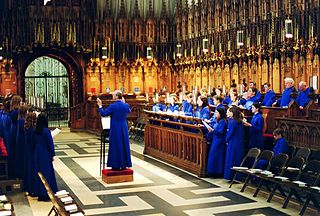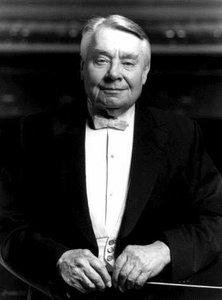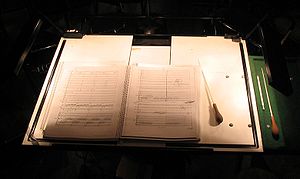
An orchestra is a large instrumental ensemble typical of classical music, which combines instruments from different families, including bowed string instruments such as the violin, viola, cello, and double bass, woodwinds such as the flute, oboe, clarinet and bassoon, brass instruments such as the horn, trumpet, trombone and tuba, and percussion instruments such as the timpani, bass drum, triangle, snare drum, cymbals, and mallet percussion instruments each grouped in sections. Other instruments such as the piano and celesta may sometimes appear in a fifth keyboard section or may stand alone, as may the concert harp and, for performances of some modern compositions, electronic instruments.

A choir is a musical ensemble of singers. Choral music, in turn, is the music written specifically for such an ensemble to perform. Choirs may perform music from the classical music repertoire, which spans from the medieval era to the present, or popular music repertoire. Most choirs are led by a conductor, who leads the performances with arm and face gestures.
Sheet music is a handwritten or printed form of musical notation that uses musical symbols to indicate the pitches, rhythms, or chords of a song or instrumental musical piece. Like its analogs – printed books or pamphlets in English, Arabic, or other languages – the medium of sheet music typically is paper, although the access to musical notation since the 1980s has included the presentation of musical notation on computer screens and the development of scorewriter computer programs that can notate a song or piece electronically, and, in some cases, "play back" the notated music using a synthesizer or virtual instruments.

Conducting is the art of directing a musical performance, such as an orchestral or choral concert. It has been defined as "the art of directing the simultaneous performance of several players or singers by the use of gesture." The primary duties of the conductor are to interpret the score in a way which reflects the specific indications in that score, set the tempo, ensure correct entries by ensemble members, and "shape" the phrasing where appropriate. Conductors communicate with their musicians primarily through hand gestures, usually with the aid of a baton, and may use other gestures or signals such as eye contact. A conductor usually supplements their direction with verbal instructions to their musicians in rehearsal.

The Eastman School of Music is the professional school of music of the University of Rochester in Rochester, New York. It was established in 1921 by industrialist and philanthropist George Eastman.

Robert Lawson Shaw was an American conductor most famous for his work with his namesake Chorale, with the Cleveland Orchestra and Chorus, and the Atlanta Symphony Orchestra and Chorus. He was known for drawing public attention to choral music through his wide-ranging influence and mentoring of younger conductors, the high standard of his recordings, his support for racial integration in his choruses, and his support for modern music, winning many awards throughout his career.

A drum major or field commander is the leader of a marching band, drum and bugle corps, or pipe band, usually positioned at the head of the band or corps. The drum major is often dressed in more ornate clothing than the rest of the band or corps and is responsible for providing commands to the ensemble, leading them while marching, and directing them what to play, when to play, and what time to keep. The commands may be given verbally, through hand gestures, using a whistle or a baton, or with a mace. Although the drum major is the one conducting for the entire band to see and watch to keep time, the drum major is actually looking at the center snare's feet to keep time. The center snare is the leader of the Drumline, and is the one who keeps the band in time while marching. He/she usually plays taps and/or some rolls to set the tempo of how fast the band marches.
The Boston Youth Symphony Orchestras (BYSO) is a youth orchestra based in Boston, Massachusetts under the artistic leadership of music director, Federico Cortese. Since 1958, BYSO has served thousands of young musicians from throughout New England with three full symphonic orchestras, two young string training orchestras, six chamber orchestras, a preparatory wind ensemble, a chamber music program and a nationally recognized instrument training program for underrepresented youth from inner-city communities called the Intensive Community Program (ICP). The 2017-2018 season marks the celebration of BYSO's 60th Anniversary. Each year, BYSO auditions approximately 850 students from throughout New England, ages 5–18, and accepts nearly 500 young musicians.

A rehearsal is an activity in the performing arts that occurs as preparation for a performance in music, theatre, dance and related arts, such as opera, musical theatre and film production. It is undertaken as a form of practising, to ensure that all details of the subsequent performance are adequately prepared and coordinated. The term rehearsal typically refers to ensemble activities undertaken by a group of people. For example, when a musician is preparing a piano concerto in their music studio, this is called practicing, but when they practice it with an orchestra, this is called a rehearsal. The music rehearsal takes place in a music rehearsal space.

Brady Allred is an American conductor of choral and orchestral music who currently serves as the artistic director and conductor of the Salt Lake Choral Artists, a regional choir organization with five choirs with a total of approximately 350 singers. He is the father of Loren Allred of The Greatest Showman fame.

René Clausen is an American composer, conductor emeritus of The Concordia Choir, and professor of music at Concordia College in Moorhead, Minnesota. His works are widely performed by high school and church choirs while his more technically demanding pieces have been performed and recorded by college and professional choirs. Among his many accolades, his recent recording, "Life & Breath: Choral Works by René Clausen," received three Grammy Awards at the 55th Grammy Awards in 2013.

A baton is a stick that is used by conductors primarily to enlarge and enhance the manual and bodily movements associated with directing an ensemble of musicians.

An audition is a sample performance by an actor, singer, musician, dancer or other performer. It typically involves the performer displaying their talent through a previously memorized and rehearsed solo piece or by performing a work or piece given to the performer at the audition or shortly before. In some cases, such as with a model or acrobat, the individual may be asked to demonstrate a range of professional skills. Actors may be asked to present a monologue. Singers will perform a song in a popular music context or an aria in a Classical context. A dancer will present a routine in a specific style, such as ballet, tap dance or hip-hop, or show his or her ability to quickly learn a choreographed danceion is a systematic process in which industry professionals select performers, which is in some ways analogous to a job interview in the regular job market. In an audition, the employer is testing the ability of the applicant to meet the needs of the job and assess how well the individual will take directions and deal with changes. After some auditions, after the performer has demonstrated their abilities in a given performance style, the audition panel may ask a few questions that resemble those used in standard job interviews.
Jean-Josaphat Gagnier was a Canadian conductor, composer, clarinetist, bassoonist, pianist, arts administrator, and music educator. His compositional output mainly consists of works for orchestra and band, although he did write some choral pieces, songs, works for solo piano and organ, some incidental music for the theatre, and a work for solo harp. His compositions are written in a wide variety of styles from romanticism to impressionism to 20th century idioms.
The Cambridge University Musical Society (CUMS) is a federation of the university's main orchestral and choral ensembles, which cumulatively put on a substantial concert season during the university term.
Ensemble librarianship is an area of music librarianship which specializes in serving the needs of musical ensembles, including symphony and chamber orchestras, opera houses, ballet companies, wind ensembles and educational institutions. Ensemble librarians acquire printed music and prepare it for performance.

Justin (Wayne) Lewis is an American conductor, cellist and educator who became a conductor in the United States Air Force Band program in 2012. He is currently the flight commander of the United States Air Force Heritage of America Band at Joint Base Langley-Eustis, Virginia and the United States Air Force Heartland of America Band at Offutt Air Force Base, Nebraska. Lewis also serves as conductor-in-residence of the Virginia Choral Society, and as a faculty member at the Pennsylvania Suzuki Institute.

Black conductors are musicians of African, Caribbean, African-American ancestry and other members of the African diaspora who are musical ensemble leaders who direct classical music performances, such as an orchestral or choral concerts, or jazz ensemble big band concerts by way of visible gestures with the hands, arms, face and head. Conductors of African descent are rare, as the vast majority are male and Caucasian.

The Southern Illinois University (SIUC) School of Music aka SOM is part of the College of Liberal Arts, and a focal point of cultural learning and activity at SIUC. Housed in Altgeld Hall, the Old Baptist Foundation Building and Shryock Auditorium, the School of Music is central to the campus both geographically and culturally.

George Ellis is an Australian conductor, composer and orchestrator. He presents concerts for international events with a broad range of styles from classical to pop/rock and jazz as well as presenting orchestral concerts for young audiences. He also lectures in Conducting at the Sydney Conservatorium of Music, and is a regular presenter of Sonic Journey for ABC Radio Sydney’s program with Simon Marnie.















